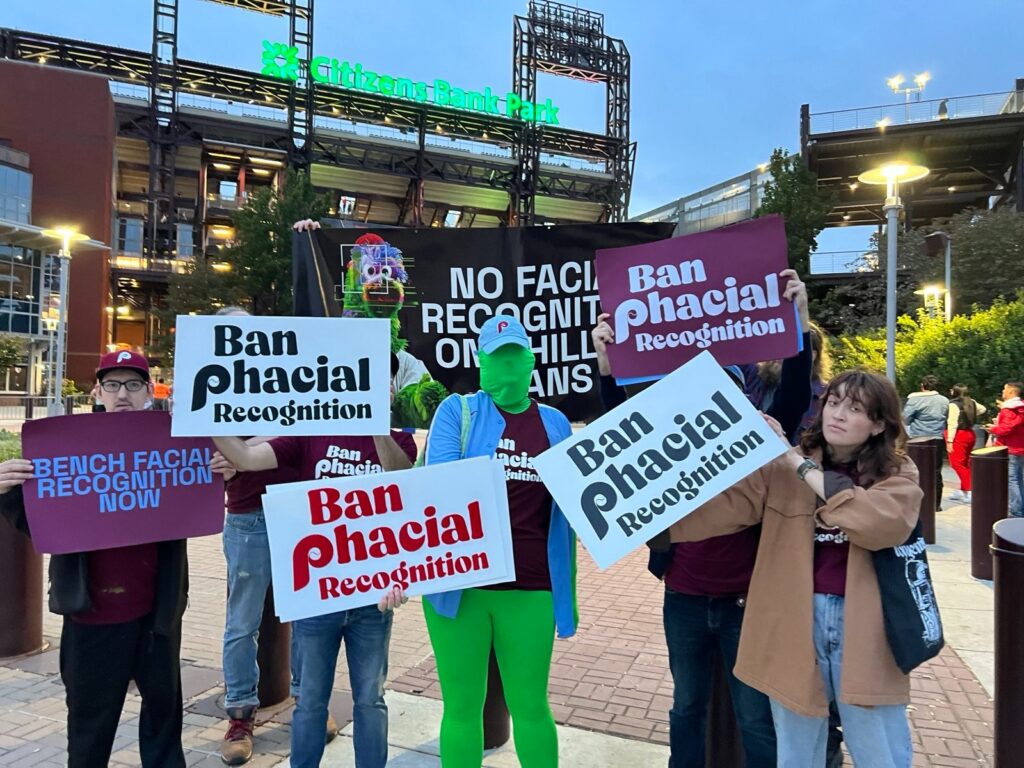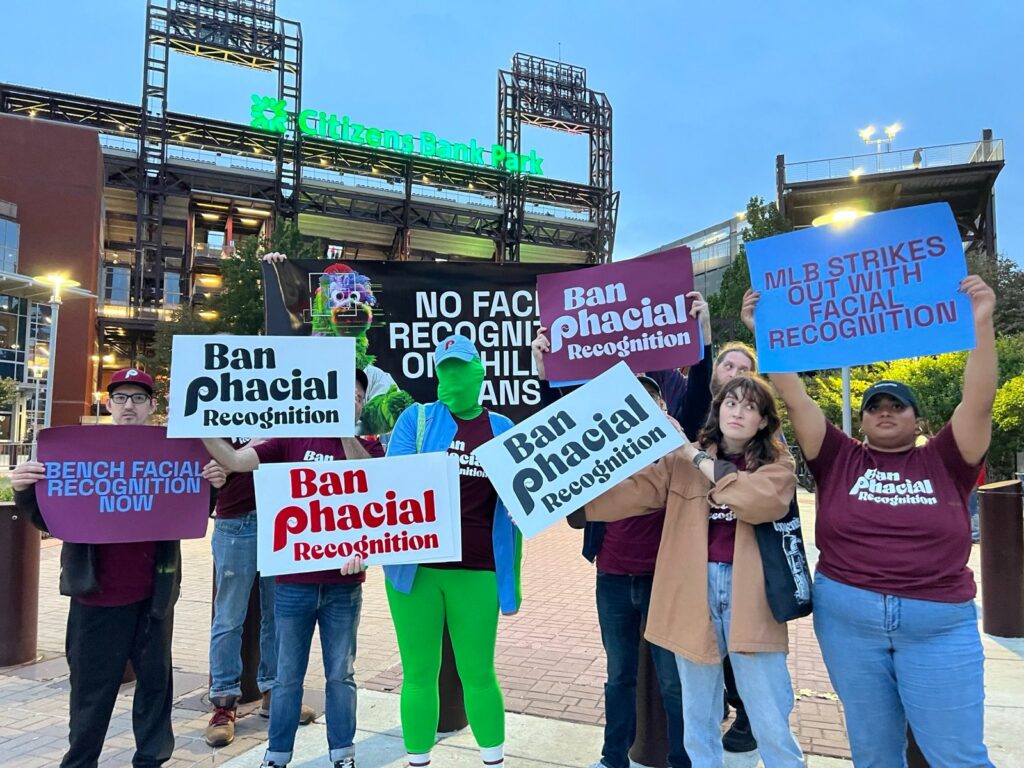Fans Cry Foul Over Facial Recognition at Stadiums
On Thursday, September 28, baseball fans and privacy advocates gathered outside the Phillies’ last home game of the regular season to protest Major League Baseball’s newly installed “Go-Ahead Entry” facial recognition ticketing system. Protestors wore T-shirts and held banners and signs opposing facial recognition. They also passed out flyers and chatted with fans about the risks of Go-Ahead Entry.
The organizers concluded the event by delivering an open letter signed by Amnesty International, Access Now, American Friends Service Committee, Muslim Advocates, and other leading human rights groups calling for a ban on all forms of biometric data collection at Major League sports stadiums.
Check out photos here: https://drive.google.com/drive/u/0/folders/1dfL-QkEbGodStYiPx9YGnxgh1F5sAem6
TikTok video from the event here: https://www.tiktok.com/@fightfortheftr/video/7283971440838446382?is_from_webapp=1&sender_device=pc&web_id=7267639818719987205
For years, biometric technologies like facial recognition have been creeping into professional sports in a range of forms, from event entry, to concession payments, to controlling players’ locker room access. Facial recognition ticketing is currently available at a range of stadiums across different leagues, but “Go-Ahead Entry” appears to be the first official league-sponsored system.
Privacy experts and racial justice advocates have consistently sounded the alarm about the dangers of facial recognition, citing its potential for supercharging existing surveillance and discrimination, allowing private companies to bar entry to whomever they choose, creating opportunities for mass-scale biometric identity theft, chilling free speech and social movements, and increasing life-threatening encounters between people of color and violent police through false matches.
“Introducing facial recognition at ballparks is a surefire way to ruin America’s national pastime, or any outing to catch your favorite team. This is techno solutionism at its worst –– we don’t need to “fix” our current system of paper or digital tickets because it isn’t broken. And there is nothing convenient about giving your most sensitive personal information to a company that could sell it, share it, or leave it unsecure so it gets stolen. The MLB needs to cancel Go-Ahead Entry, reject vendors that use facial recognition for payments, and all other sports leagues and stadiums need to reject this surveillance tech. We call foul and are ready to play hardball to protect peoples’ rights,” said Caitlin Seeley George, campaigns and managing director at Fight for the Future.
“It should only be the action that keeps fans on the edge of their seats at sporting events — not the threat of mass facial and biometric surveillance technologies. These dangerous technologies frequently misidentify people of color, and gather mass amounts of unreliable data that has already been used by police to arrest and imprison the wrong people. There is no place for violating civil and human rights in sports, which at their best bring fans of different backgrounds together and unite them. All professional sports leagues must ensure those who enter their stadiums are free from harmful surveillance,” said Michael De Dora, U.S. Policy and Advocacy Manager at Access Now.
In just one example exposing the dangerous inaccuracy of facial recognition, a 2019 experiment by the ACLU fed photos of high-profile professional athletes from Massachusetts to facial recognition software that falsely matched the official headshots of 27 athletes to mug shots in a law enforcement database.
Resistance to police and law enforcement use of facial recognition took off in 2020 and pushed top companies like Amazon, Microsoft, and IBM to put moratoriums on the sale of their facial recognition tools to law enforcement. Cities, counties and states also passed strict regulations on the use of facial recognition by law enforcement, raising issues of racial discrimination and invasion of privacy.
Since then, resistance to the use of facial recognition by companies and businesses has also gained momentum. Earlier this year, after news broke about the owner of Madison Square Garden using facial recognition to ban his foes from events, over 100 venues and artists signed a pledge opposing all forms of facial recognition at live shows. In 2022, over 300 artists shut down palm scanning ticketing at Red Rocks, citing similar concerns related to the mass collection of biometric data.
“EPIC is proud to join this powerful coalition urging Major League Baseball to end the use of facial recognition at sporting events and venues. Facial recognition systems like this have little to no tangible benefits to fans, weaken our collective privacy, and pose heightened risks to marginalized groups, particularly people of color. Major League Baseball must be a leader on this and just say no to facial recognition,” said Jake Wiener, Counsel at the Electronic Privacy Information Center (EPIC).
###




